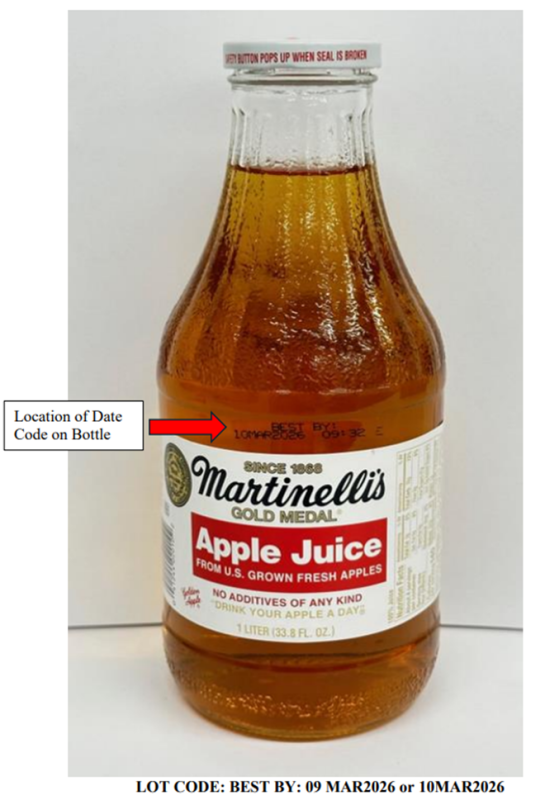Over 20,000 Cases of Apple Juice Recalled Due to Contamination Concerns

Variety of apple juice stocked on store shelves.
Before you happily chug away at your (or your child's) stock of Martinelli's Gold Medal Apple Juice, you'll want to check the label, as over 20,000 cases of the product have been recalled.
The voluntary recall was initially issued by S. Martinelli & Co. on Tuesday, April 16, after sampling conducted by the State of Maryland found “elevated” levels of inorganic arsenic, according to an official notice shared by United Natural Foods, Inc. (UNFI), along with a recent report from Food Safety News.
The ongoing recall affects approximately 25,000 cases of the additive-free Martinelli’s Gold Medal Apple Juice From U.S. Grown Fresh Apples 1 Liter (33.8 fl oz.), all of which have best-by dates of March 9 and 10, 2026, the UPC 0 00 41244 00102 6 and a production dates of March 10, 2023.
The product in question is sold at Kroger, Publix, Target, Winn-Dixie and Whole Foods, per the company's website.

S. Martinelli & Company
S. Martinelli & Co. has since reached out to vendors in the 34 U.S. states where the juice is sold, which reportedly include Alaska, Arkansas, Arizona, California, Colorado, Florida, Georgia, Iowa, Idaho, Illinois, Indiana, Kansas, Kentucky, Louisiana, Maryland, Michigan, Minnesota, Missouri, Mississippi, North Carolina, New Hampshire, New Jersey, New York, Ohio, Oklahoma, Oregon, Pennsylvania, South Carolina, Tennessee, Texas, Utah, Virginia, Washington and Wisconsin. The company also flagged the recall to distributors in Puerto Rico and Panama, per Food Safety News.
“At S. Martinelli & Company, we hold ourselves to the highest standards of excellence, and the health and safety of our customers remains our greatest priority,” a rep from the company shared in a May 8 statement with People. “In full cooperation with the U.S. Food & Drug Administration (FDA), we issued a voluntary recall; we will continue to cooperate with the FDA on any further direction, beyond what was already sent out to our retail customers."
"We have not had any reported health issues related to the voluntary recall," it concluded. Still, consumers are warned not to use the recalled products and instead throw them out or return them to the store where they were purchased.
Inorganic arsenic levels are capped at 10 parts per billion, according to guidance finalized by the FDA last summer. The apple juice tested in Maryland was flagged for just over that, at 11.6 parts per billion.
"Current research indicates that inorganic arsenic is more dangerous than organic arsenic and the health effects from exposure are more severe," according to the agency.
As for the health effects, arsenic can affect people of any age or health status but some—including fetuses, infants and children—are at a higher risk for more extreme symptoms than others, as the FDA found "exposure to high levels of arsenic during times of active brain development is associated with adverse neurological effects" and developmental defects.
For adults, long-term exposure to inorganic arsenic has been associated with skin disorders and increased risks for skin, bladder, and lung cancers, and cardiovascular disease.
Short-term exposure to very high amounts of inorganic arsenic can result in nausea, vomiting, bruising, and numbness or burning sensations in the hands and feet for people of all ages.
Next: More Than 16,000 Pounds of Ground Beef Is Being Recalled Nationwide—Here's What You Need to Know
